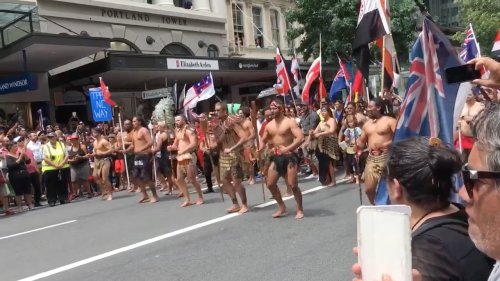NZ Herald | 24 October 2021
Jane Kelsey: Such a good free trade agreement with the UK, we aren’t allowed to read it
by Jane Kelsey
With the release of an Agreement in Principle for a New Zealand United Kingdom free trade agreement (FTA) we are once again left shadow boxing with a deal whose text we aren’t allowed to see.
Both governments had a free run to spin their good news stories to a largely compliant media supported by the business lobbies. Now the buzz has settled, I offer a more sober reflection.
Just look at the world around us and here in Aotearoa. A global pandemic has exposed the vulnerabilities of our deep global inter-dependency, fragile and fragmented supply chains causing shortages and increasing costs, narrow commodity-driven export economy and exploitation of migrant labour to compensate for decades of disinvestment in our skilled workforce and liveable wages.
The same story is writ large, exacerbated by a vaccine apartheid between rich and poor countries where highly subsidised pharmaceutical giants use the monopoly patents guaranteed them in free trade agreements to hold government budgets and people’s lives to ransom.
Even before the pandemic, the climate crisis made that model totally unsustainable. So have the successive financial crises and bubbles – evidenced by our dependence on housing speculation to fuel wealth creation.
We can’t continue with this broken model. We need a radical rethinking of the values and goals of our inter-relationship with other countries as we confront the challenges of the 21 century.
Yet this free trade agreement gives us more of the same, with a bit of tinsel. References to sustainability, climate change, environment, Māori, gender, labour, small businesses are a chimera. Most appear to be "soft" and unenforceable, reiterating "recognising" or "acknowledging" existing commitments or promising to "cooperate" or "work together towards".
The approach to unsustainable fisheries won’t address the major problem in this country, the flawed quota management regime, just as the climate change provision won’t affect agriculture as our major carbon emitter. The Indigenous Trade and Labour chapters look to be unenforceable.
So much for the "progressive and inclusive" agenda Labour promised to justify its about face in accepting the Comprehensive and Progressive Agreement on TransPacific Partnership (CPTPP) in 2016.
The guts of the deal for the New Zealand Government, media and business is market access for primary products over a 15-year period.
Any diversification from the chronic overdependence on the China market is welcome. But, as Labour itself had previously recognised, the econometric modelling it used relies on flawed assumptions with fanciful outcomes. Even then, the projected gain of "up to $970 million" of GDP – presuming a (generous) 2.5 per cent growth out to 2036, around 0.014 per cent of GDP per year - is a drop in the economic bucket to be achieved after 15 years.
The British Government itself has downplayed the economic relevance of the deal, citing instead New Zealand’s sign-off for it to join the CPTPP and furthering its foreign policy goal of engaging with the "Indo-Pacific", seen recently with the Aukus nuclear submarine deal.
If the deal is simply short-sighted and its benefits over-egged, maybe there is no real problem. But the Agreement in Principle indicates some positively harmful elements.
A number appear to go beyond the CPTPP, New Zealand’s most extensive to date. Despite recognition that New Zealand needs more local processing of natural resources, such as logs, and foreign firms employing more New Zealanders, such "performance requirements" on foreign investors will be prohibited.
Foreign investment will become even easier for UK corporations. That includes Britain’s giant insurers and finance firms, who will be free to deliver services from their home base and hold our data wherever they wish.
Restrictions on regulating big tech and what they can do with data apply more generally, although here the Agreement in Principle is vague. Britain’s publishing and entertainment industry secured a 20-year extension to copyright that was suspended in the CPTPP.
Most worrying for domestic policy, the Government is embedding even further its commitment to light-handed regulation that brought us leaky buildings, the Pike River disaster, tragically high accident and death rates in forestry, construction and ports, finance company collapses, warranting of unsafe motor vehicles, minimally-regulated rest homes and more.
The standard inadequate exceptions that are routinely cited by trade officials and politicians have been rolled over, including for the Treaty of Waitangi.
Four years ago, the Labour Government promised a "Trade for All" review that would address all of these issues. How much longer must we wait before the politicians and the trade bureaucracy are prepared to get off the free trade agreement merry-go-round they’ve been on for the past 40 years and confront these challenges while we still can?
Jane Kelsey is a professor of law at the University of Auckland.
